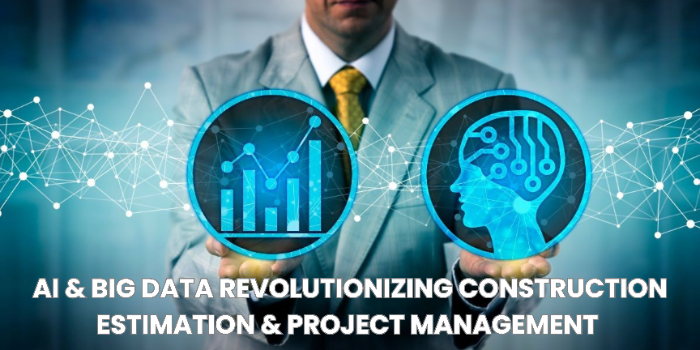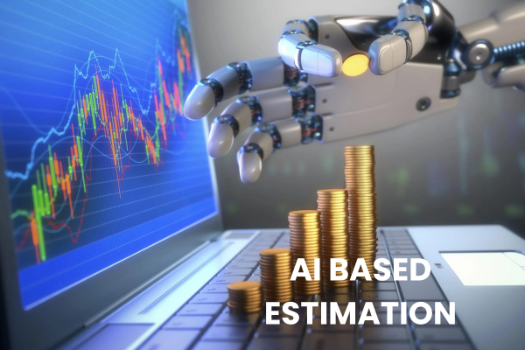
Unlocking Success: How AI and Big Data are Revolutionizing Construction Estimation and Project Management
In today’s fast-paced construction industry, the integration of cutting-edge technology is no longer a luxury—it’s a necessity. Among the most transformative advancements are artificial intelligence (AI) and big data, both of which are redefining how construction estimation and project management are executed. This winning combination empowers construction professionals with powerful, actionable insights that streamline processes, minimize risks, and optimize project outcomes. In this article, we’ll explore how AI and big data are reshaping the construction landscape, provide detailed case studies, and uncover why these innovations are vital for the industry's future.
The Shift to Digital Transformation in Construction
The construction industry has historically been slow to adopt new technologies, often relying on traditional estimation and project management methods. However, the tide is turning. As projects become more complex and client demands grow, construction firms are recognizing the need for digital transformation. AI and big data are at the forefront of this shift, providing companies with the tools to improve accuracy, efficiency, and profitability.
From automating cost estimation to optimizing project schedules, AI and big data are revolutionizing every phase of construction. The synergy between these technologies allows construction professionals to predict outcomes with greater accuracy, reduce overhead, and make more informed decisions.
AI in Construction Estimation: Enhancing Accuracy and Efficiency
One of the most significant challenges in construction is accurately estimating project costs. Underestimating or overestimating can lead to financial losses, project delays, and dissatisfied clients. AI is helping to mitigate these risks by leveraging historical data, machine learning algorithms, and predictive analytics to generate more accurate cost estimates.

How AI Enhances Construction Estimation:
Automated Quantity Takeoff: AI-powered tools can automatically extract quantities from building information models (BIM), reducing the time and effort required for manual takeoff. This automation leads to faster, more accurate estimates, allowing construction firms to bid more competitively.
Cost Prediction Models: Machine learning algorithms analyze historical cost data to predict future costs with remarkable accuracy. These models take into account variables such as material prices, labor rates, and project-specific factors, enabling estimators to make data-driven decisions.
Real-Time Adjustments: AI systems can continuously monitor project variables and update cost estimates in real time. This dynamic approach ensures that estimators are working with the most current information, reducing the likelihood of budget overruns.
Big Data in Project Management: Transforming Decision-Making
Big data is revolutionizing project management by providing construction firms with unprecedented access to actionable insights. By analyzing large datasets from past and ongoing projects, companies can make more informed decisions that improve project outcomes. Big data helps project managers identify patterns, forecast potential risks, and optimize resources for maximum efficiency.
Key Benefits of Big Data in Project Management:
.webp)
Improved Resource Allocation: Big data analytics allow project managers to assess resource availability and allocation with precision. By analyzing data on labor, materials, and equipment, managers can ensure that resources are used efficiently, reducing waste and avoiding costly delays.
Proactive Risk Management: Big data enables project managers to identify potential risks before they escalate. By analyzing historical data and real-time information, managers can anticipate challenges such as weather delays, supply chain disruptions, or labor shortages, allowing them to implement contingency plans in advance.

Enhanced Collaboration: Data-driven project management tools facilitate better communication and collaboration among project stakeholders. By providing real-time access to data, project managers can ensure that all parties are aligned and working toward common goals.
Case Studies: Real-World Applications of AI and Big Data in Construction
To fully understand the transformative power of AI and big data in construction estimation and project management, let’s look at two real-world case studies where these technologies have been successfully applied.
Case Study: The Los Angeles Rams’ SoFi Stadium
.jpg)
Project Overview: The SoFi Stadium in Inglewood, California, is a state-of-the-art sports and entertainment complex that serves as the home for the NFL’s Los Angeles Rams and Chargers. Covering 298 acres, the stadium includes a massive roof canopy, retractable seating, and high-tech infrastructure, making it one of the most technologically advanced stadiums in the world.
Challenge: The sheer scale of SoFi Stadium posed numerous challenges, including budget constraints, tight deadlines, and complex architectural designs. Coordinating resources, managing a multi-phase construction schedule, and ensuring cost efficiency required a high level of precision that traditional methods couldn't easily provide.
Solution: AI-powered cost estimation tools were used to create predictive models that accounted for fluctuating material costs, labor availability, and potential risks. Big data analytics were integrated into project management processes, allowing the construction team to monitor progress in real time and adjust schedules and resources as needed. AI-driven algorithms also analyzed weather patterns, which helped optimize construction timelines and mitigate potential delays.
Results: The application of AI and big data technologies contributed to the successful completion of SoFi Stadium on time and within budget. The use of AI-driven predictive models reduced material waste, while big data analytics enabled better resource allocation and decision-making. This led to significant cost savings and improved overall project efficiency.
Case Study: The Intel Oregon Manufacturing Facility Expansion, USA
.jpg)
Project Overview: Intel's expansion of its manufacturing facility in Hillsboro, Oregon, is one of the largest private construction projects in the United States. The project involved constructing new fabrication plants, research and development facilities, and supporting infrastructure, requiring precise coordination and scheduling.
Challenge: The scale and technical complexity of the project, combined with the need for strict adherence to timelines and budgets, required advanced solutions. Traditional methods of cost estimation and project management were insufficient to handle the scope of the project, and the precision required for a high-tech manufacturing facility.
Solution: AI and big data were pivotal in the successful management of this expansion project. AI-driven tools were employed to create detailed cost estimates, considering the specific requirements of constructing clean rooms, installing advanced manufacturing equipment, and ensuring compliance with stringent safety and environmental standards.
Big data analytics provided real-time insights into every aspect of the project, from material deliveries to workforce productivity. The project management team used this data to make informed decisions on resource allocation, identify potential bottlenecks, and adjust schedules as needed. Additionally, predictive analytics helped forecast potential delays or cost overruns, allowing the team to implement mitigation strategies proactively.
Results: The use of AI and big data in the Intel Oregon expansion resulted in a highly efficient construction process, with the project being completed ahead of schedule and within budget. The ability to make data-driven decisions in real time was key to managing the complexities of the project, ensuring that Intel could meet its aggressive timelines for bringing new manufacturing capabilities online.
The Future of AI and Big Data in Construction
As AI and big data technologies continue to evolve, their influence on the construction industry will deepen, ushering in an era of unprecedented efficiency, precision, and innovation. The future holds exciting possibilities that could further transform construction estimation and project management.
1. Integration with Advanced Robotics
One of the most promising areas of development is the integration of AI and big data with advanced robotics. AI-powered robots are already making inroads into construction sites, performing tasks such as bricklaying, painting, and even complex structural assembly. Soon, these robots will not only carry out physical tasks but will also be able to adjust their actions based on real-time data analytics. For instance, AI-driven robots could receive updates from big data platforms about changes in design specifications, weather conditions, or material availability, allowing them to adapt on the fly and ensure that construction activities proceed smoothly without delays.
2. Predictive Analytics for Enhanced Forecasting
As big data analytics grow more sophisticated, predictive modeling in construction will become even more accurate and reliable. Currently, AI can predict project costs and schedules based on historical data and existing variables. However, future advancements may enable these models to incorporate a broader range of factors, such as global economic trends, geopolitical events, and environmental considerations. This would allow construction firms to forecast project outcomes with remarkable precision, further reducing risks and enhancing profitability.
Imagine a construction company that can predict with high certainty how a global supply chain disruption might affect material costs or how changes in environmental regulations could impact project timelines. With such insights, firms can make strategic decisions long before challenges arise, staying ahead of the competition and delivering projects with greater confidence.
3. AI-Driven Collaboration Platforms
The future of construction will likely see the rise of AI-driven collaboration platforms that bring all stakeholders—architects, engineers, contractors, clients, and suppliers—onto a single digital ecosystem. These platforms will use AI to analyze and synthesize input from all parties, providing real-time updates, recommendations, and decision-making support. Such a system could, for example, automatically flag potential design conflicts, suggest alternative materials, or optimize the construction schedule based on input from multiple stakeholders.
These platforms would not only improve communication and coordination but also help to democratize access to information, ensuring that even smaller contractors can benefit from the same level of insight and efficiency as larger firms.
4. AI-Powered Sustainability
As sustainability becomes an increasingly critical concern in construction, AI and big data will play a key role in driving environmentally friendly practices. AI can analyze vast amounts of data related to energy consumption, waste generation, and carbon emissions, helping construction firms minimize their environmental impact. For example, AI could optimize the use of renewable energy sources on construction sites or suggest materials and methods that reduce waste.
Big data, on the other hand, could track the long-term environmental performance of buildings and infrastructure, providing valuable feedback that can be used to improve future projects. In this way, AI and big data are not only enhancing the efficiency of construction processes but are also contributing to the creation of a more sustainable built environment.
.avif)
Embracing the Future with AI and Big Data
The construction industry is at a pivotal moment, where the adoption of AI and big data is no longer a choice but a necessity for those who wish to remain competitive. The examples and case studies discussed in this article illustrate how these technologies are already making a profound impact on construction estimation and project management, delivering tangible benefits in terms of cost savings, efficiency, and risk mitigation.
As these technologies continue to evolve, their potential will only grow, offering even greater opportunities for innovation and improvement in the construction sector. Companies that embrace AI and big data now will be well-positioned to lead the industry into the future, unlocking new levels of success and setting new standards for excellence.
For construction professionals, the message is clear: the future is digital. By integrating AI and big data into your workflows, you can enhance your ability to deliver projects on time, within budget, and to the highest quality standards. The time to start is now—because the future of construction is already here.
Check https://app.bidlight.com for how BidLight can help you estimate your project!